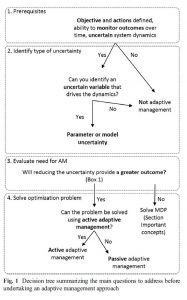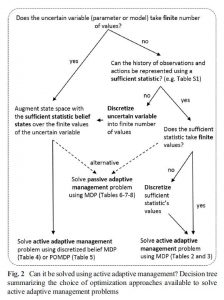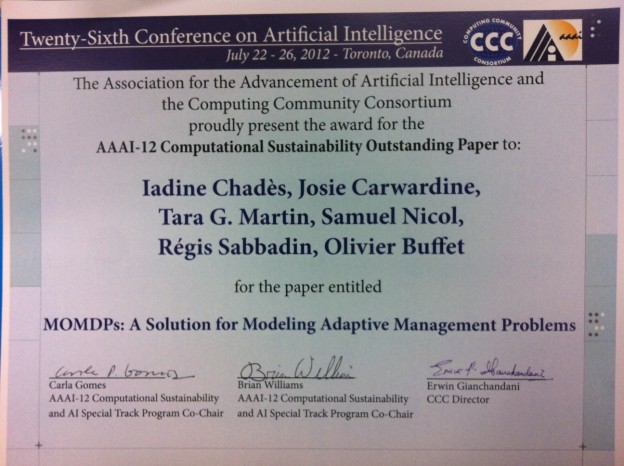Do you need to manage a system over time but are uncertain about what will happen in the future? Well! Adaptive management, or learning by doing, might provide a solution. The issue with adaptive management is that no one knows what it is or how to do it, because it has been used in many different fields of research for a different purpose and with a different meaning. In my research, I am interested in the decision theoretic approach of adaptive management (not the resilience approach). What does that mean? That means that I look for ways of providing adaptive decisions that will insure that you would make the best decisions possible over time. That’s right, our approaches account for all the things that could go wrong or right in our decisions before any humans do.

In our paper “Optimization methods to solve adaptive management problems” (Theoretical Ecology (2016). doi:10.1007/s12080-016-0313-0), we review the methods that would allow you to optimize your adaptive management strategies.
The fun bits: We provide decision trees that would help you choose between different type of approaches available (passive or active adaptive management); We explain the differences and similarities between these approaches; And, we provide 8 algorithms that will help you understand and write your own code – Have I mentioned a bunch of reference to explore?
This paper concludes the 3 years of my CSIRO Julius Career Award on studying adaptive management problems. I am thankful to all my co-authors for their contributions, but also the adaptive management community more broadly.
Reflecting back, I really needed this paper when I started, and I hope this will help others. I studied adaptive management methods by accident 6 years ago. At the time I was overwhelmed. I couldn’t understand why there were so many different terminology to define a problem. I couldn’t understand why there were so many approaches available that did not seem to be efficient. Inspired by Darryl MacKenzie’s paper, I took a POMDP perspective, how would I model this problem? One thing, leading to another, and some precious collaborations, led to a best paper award at the 2012 AAAI conference. The power of using POMDP is illustrated in Sam’s Proc B paper (you can read about it here). In my opinion, much more could be done to exploit this result and we are just scratching the surface, so stay tuned!
The utlimate reference:
Chadès, I., Nicol, S., Rout, T.M., Peron M., Dujardin Y., Pichancourt JB., Hastings A., Hauser C. Optimization methods to solve adaptive management problems. Theoretical Ecology (2016). doi:10.1007/s12080-016-0313-0 (request PDF)
The ultimate abstract:
Determining the best management actions is challenging when critical information is missing. However, urgency and limited resources require that decisions must be made despite this uncertainty. The best practice method for managing uncertain systems is adaptive management, or learning by doing.
Adaptive management problems can be solved optimally using decision-theoretic methods; the challenge for these methods is to represent current and future knowledge using easy-to-optimize representations. Significant methodological advances have been made since the seminal adaptive management work was published in the 1980s, but despite recent  advances, guidance for implementing these approaches has been piecemeal and study-specific. There is a need to collate and summarize new work. Here, we classify methods and update the literature with the latest optimal or near-optimal approaches for solving adaptive management problems. We review three mathematical concepts required to solve adaptive management problems: Markov decision processes, sufficient
advances, guidance for implementing these approaches has been piecemeal and study-specific. There is a need to collate and summarize new work. Here, we classify methods and update the literature with the latest optimal or near-optimal approaches for solving adaptive management problems. We review three mathematical concepts required to solve adaptive management problems: Markov decision processes, sufficient
statistics, and Bayes’ theorem.We provide a decision tree to determine whether
adaptive management is appropriate and then group adaptive management approaches based on whether they learn only from the past (passive) or anticipate future learning (active).We discuss the assumptions made when using existing models and provide solution algorithms for each approach. Finally, we propose new areas of development that could inspire future research. For a long time, limited by the efficiency of the solution methods, recent techniques to efficiently solve partially observable decision problems now allow us to solve more realistic adaptive management problems such as imperfect detection and non-stationarity in systems.

